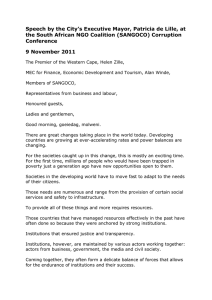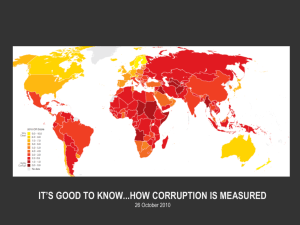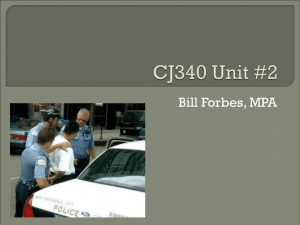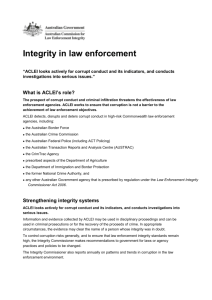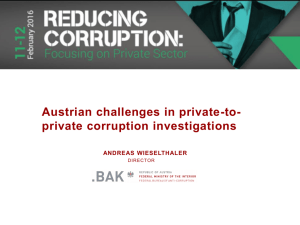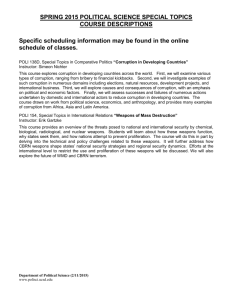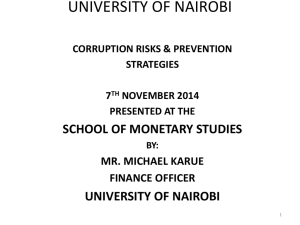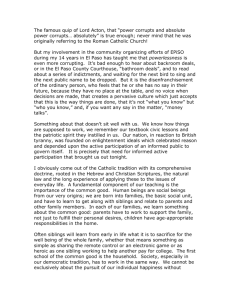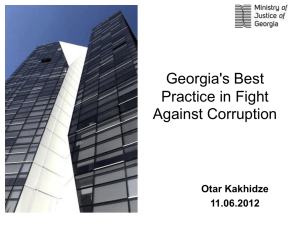Integrity Leadership - Australian Commission for Law Enforcement
advertisement
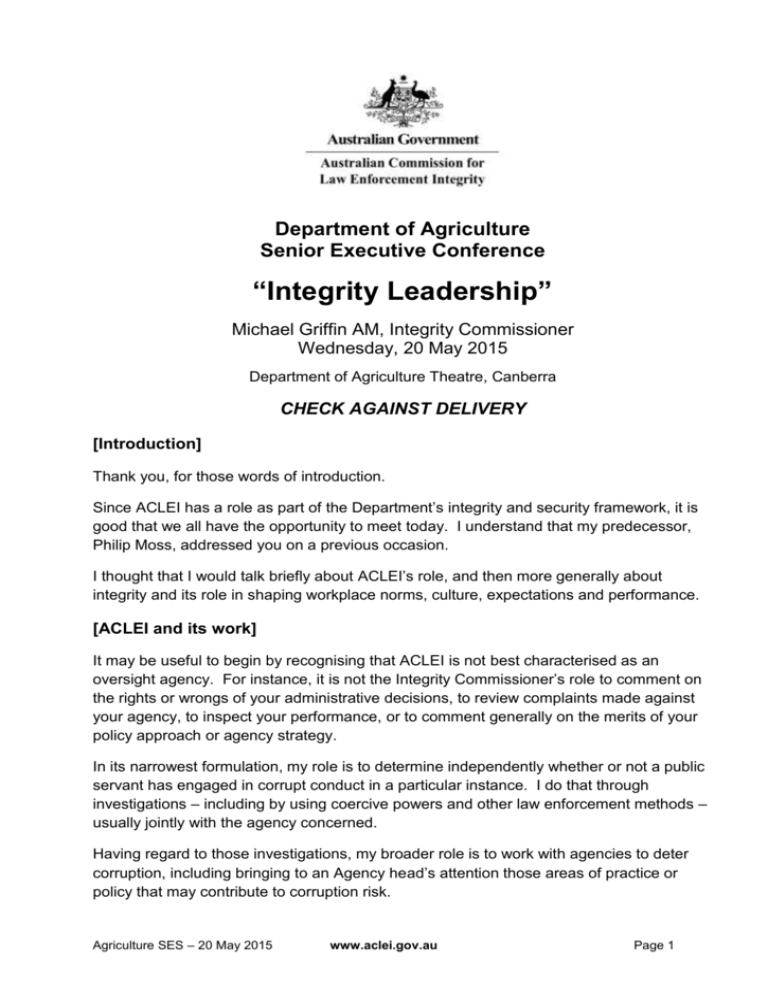
Department of Agriculture Senior Executive Conference “Integrity Leadership” Michael Griffin AM, Integrity Commissioner Wednesday, 20 May 2015 Department of Agriculture Theatre, Canberra CHECK AGAINST DELIVERY [Introduction] Thank you, for those words of introduction. Since ACLEI has a role as part of the Department’s integrity and security framework, it is good that we all have the opportunity to meet today. I understand that my predecessor, Philip Moss, addressed you on a previous occasion. I thought that I would talk briefly about ACLEI’s role, and then more generally about integrity and its role in shaping workplace norms, culture, expectations and performance. [ACLEI and its work] It may be useful to begin by recognising that ACLEI is not best characterised as an oversight agency. For instance, it is not the Integrity Commissioner’s role to comment on the rights or wrongs of your administrative decisions, to review complaints made against your agency, to inspect your performance, or to comment generally on the merits of your policy approach or agency strategy. In its narrowest formulation, my role is to determine independently whether or not a public servant has engaged in corrupt conduct in a particular instance. I do that through investigations – including by using coercive powers and other law enforcement methods – usually jointly with the agency concerned. Having regard to those investigations, my broader role is to work with agencies to deter corruption, including bringing to an Agency head’s attention those areas of practice or policy that may contribute to corruption risk. Agriculture SES – 20 May 2015 www.aclei.gov.au Page 1 ACLEI’s jurisdiction is limited to prescribed law enforcement agencies, which is defined in the legislation to include various elements of the Department of Agriculture, as well as the Commonwealth agencies we might more readily think of as falling within the law enforcement community. The primary reason for that breadth of jurisdiction lies in the unhealthy interest that organised crime gangs have shown in almost anyone who operates in the Australian border environment. It is a case of the Government wishing to ensure that there are no gaps in relation to such a high risk area of public administration. ACLEI’s practice is to work cooperatively with agencies. We have an excellent relationship with the Department of Agriculture. My own dealings with the Acting Secretary and senior executive have been outstanding – it is a free and open exchange about risk and how to manage it. ACLEI’s Executive Directors, investigators and corruption prevention officers enjoy a similarly productive engagement with the Department’s Governance Branch. We learn from one another. We are robust in our dealings. We engage with risk. The “integrity partnership” model has proven a useful basis for our work together. ACLEI has been careful to treat your information with respect, to not grandstand in the media, and to treat witnesses fairly and according to the facts. We are equally mindful of biosecurity risks, and the need for you to achieve your service delivery mission. Last year, ACLEI worked with the Department of Agriculture to help prepare a Fraud and Corruption Risk Assessment. The material produced by the Department was very high quality – easily one of the best ACLEI has seen. If you are not familiar with it, I recommend that you obtain a briefing about the risks you may be managing in your Branches and Divisions. One of the risks identified was the prospect that an Agriculture employee might solicit a bribe to obtain special treatment for a member of the public seeking to engage with one of Agriculture’s regulatory functions. The risk was one of several identified by your own employees, who manage the risk on the wharves and in quarantine premises every day. As many of you would know, ACLEI, the AFP and the Department have since investigated a (now former) staff member for exactly this type of offence. The matter is now before the courts. Putting the specifics of that issue to one side, there are three general lessons we can take from corruption investigations. The first lesson is that corruption occurs around saleable assets. The second lesson is that not everyone you manage has the same values as you. The third lesson is that while it isn’t a widespread problem in Australian Government, corruption does become more likely when risk awareness is low and even more so when complacency or scepticism are high. Accordingly, it is a worthwhile exercise to reflect on what information or discretionary powers under your management could be of value to someone else to the extent that he or she would be willing to pay for it. Again, you may wish to consult the Department’s Fraud and Corruption Risk Assessment or speak to the Assistant Secretary Governance. Agriculture SES – 20 May 2015 www.aclei.gov.au Page 2 [Shaping culture] When talking about corruption, one’s mind tends to alight almost automatically on “finding the wrong-doers”. In one way, that is a good thing – since it starts to get us thinking about who in the organisation might be a risk-taker and perhaps more susceptible to acting improperly. However, focusing only on “bad apples” or on “what went wrong” can miss an important point, which is that integrity shapes culture. Integrity is a useful message stick: it reminds public servants about the public value they generate – the how and why of their roles inherently, it invokes concepts of fairness and inclusion and appropriateness it is a vehicle to remind people about standards, including work performance it is a motivation tool that rewards a job well done it gives a framework in which to have difficult conversations about risk it is a means to talk with staff members about their goals and aspirations, and about your expectations in the workplace and your approach to leadership. It is not a bad thing to be a manager who your staff and organisation associate with integrity. [Conclusion] I am pleased indeed that Agriculture and ACLEI have formed such a strong relationship over the almost two years that the Department has been part of the Integrity Commissioner’s jurisdiction. It shows me that your leaders understand the role of integrity in shaping the Department’s outlook, and its future. It shows me that you understand ACLEI is doing far more than looking for bribe takers and mischief makers. Let me conclude my formal remarks today by recognising you as leaders. I hope that my observations will be of assistance to you in your roles. Thank you for your attention today. I welcome any questions you may have. Agriculture SES – 20 May 2015 www.aclei.gov.au Page 3

